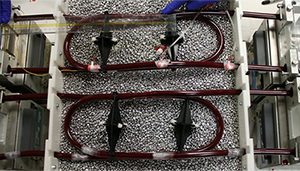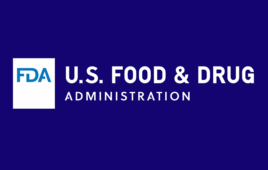American Preclinical Services has developed a novel assay that its creators think could replace the thromboresistance animal tests for medical devices – which use dogs, sheep and pigs.
Mark E. Smith, American Preclinical Services

The replacement assay – the In-vitro Blood Loop Assay – utilizes blood from donor sheep pumped through a closed tubing loop, which simulates the circulation in the animal. [Image courtesy of American Preclinical Services]
One of the primary requirements for blood-contacting medical devices such as catheters, sheaths, introducers, wires and the whole family of implantables such as stents and valves is the ability of the intact device or the material from which it is constructed to offer resistance to platelet adhesion, activation and eventual blood clot formation. In other words, blood-contacting devices need to demonstrate materials-mediated thromboresistance.
There is a conventional test that has been around for many years called the NonAnticoagulated Venous Implant (NAVI) assay, which FDA often requires for final approval of blood-contacting medical devices. This test uses at minimum two large animals – typically dogs, sheep or pigs. During this evaluation, the animals are anesthetized and the devices to be tested are placed in the animals’ veins or arteries for about four hours. The animals are then humanely euthanized; the devices are removed and evaluated for blood clot formation on the surface and at the implant site in the blood vessel.
Overall, the reproducibility of the NAVI test is poor, the number of tested devices is insufficient to allow statistical analysis (typically only two test articles and two comparator devices, and the test often yields ambiguous results. It is widely accepted that the animal test presently used does a poor job in assuring adequate thromboresistance evaluation of new devices; such evaluation is need to show the devices will be safe when placed in a patient’s bloodstream. Also, the regulatory direction when a test fails is to add additional animals – which can result in an unclear outcome, a definite waste of experimental animals.
At American Preclinical Services, we have developed a novel assay which we hope will eventually replace the commonly used animal-based NAVI test. Our replacement assay – the In-vitro Blood Loop Assay – utilizes blood from donor sheep pumped through a closed tubing loop, which simulates the circulation in the animal. The test and comparator devices (up to nine of each, allowing statistical assessment of endpoints) are deployed in the flowing blood for a similar duration of about four hours, after which the devices are removed and quantitatively evaluated for the presence of blood clots in a manner similar to that used in the NAVI model.
American Preclinical Services in May published a paper about the assay in The American Society of Mechanical Engineers’s Journal of Medical Devices. Our research demonstrated a high confidence in similarity between the NAVI animal model and the circulating blood-loop model, and we are continuing to collect data supporting the validation of the test and its ability to accurately predict device safety. The goal of FDA regulators, who are responsible for approving medical devices, is to be able to guarantee safety of new products. This new in vitro test utilizes reproducible positive and negative controls, allows a robust assessment of individual animal variability, provides a larger number of replicates for device assessment and will eventually lead to a more accurate comparison of new devices with legally-marketed comparators to assure that they will be safe during clinical use. APS is presently collaborating with researchers at the U.S. Food and Drug Administration to ensure that this assay, if ultimately deemed acceptable by the FDA, has the potential to significantly improve testing accuracy and to dramatically reduce the number of animals used for routine testing of this class of devices.
American Preclinical Services (APS) has been awarded AAALAC’s 2017 Global 3Rs Award for North America – a significant acknowledgement from a well-respected external organization that APS’s ongoing efforts to redesign thrombogenicity testing can have a global impact. The end-goal is to significantly enhance the accuracy and performance of thrombogenicity testing and substantially reduce the number of research animals used to accomplish these goals.
Within the past few months, several large and small medical device manufacturers have successfully used this new in vitro test in lieu of the current animal test (NAVI) in routine submission packages for blood-contacting medical devices. We are eagerly awaiting the expanded use of the assay among our colleagues in other U.S. medical device testing laboratories. We are presently submitting our findings to the FDA so that the test can be recognized as a suitable replacement for the in NAVI thrombogenicity tests.
At the very least, the approval of this test method by the FDA will provide medical device manufacturers and other contract research organizations a superior alternative method for testing that is acceptable for use in manufacturers’ submissions to regulatory bodies for approval.
Mark E. Smith has served as chief scientific officer of American Preclinical Services (Coon Rapids, MN) since APS became operational in 2006. Smith has more than 25 years of experience in pre-clinical drug/medical device discovery and development. Smith earned his PhD from the University of Texas Medical Branch, Galveston in 1977, and was a postdoctoral fellow and staff fellow at the National Institutes of Health from 1977 through 1985.




American Preclinical Services Develops Novel Assay that could Replace the Thromboresistance Animal Tests .
It is indeed novel approach for avoiding or reducing use of Large animals in Medical Implants safety evaluation as per ISO GUIDELINE. I would appreciate if it is approved by Regulatory Authority.
APS submitted our final testing protocol to the FDA in July for consideration of the issuance of a master file testing number with the agency, we are awaiting their response